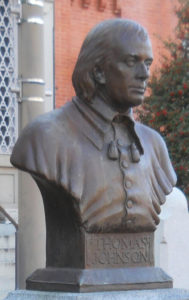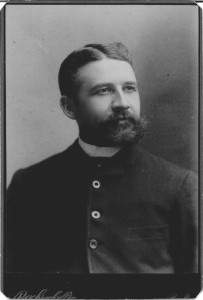Galt Starts the Effort to Recognize Thomas Johnson
by James Rada, Jr.
Thomas Johnson was the first governor of Maryland, serving from March 21, 1777, to November 12, 1779. “John Adams said that Governor Thomas Johnson of Maryland was one out of four citizens of Maryland and Virginia without whom there would have been no revolution,” John Williamson Palmer wrote in Century Magazine.
Johnson was one of the forgotten Founding Fathers, which was a problem that Sterling Galt of Emmitsburg set out to correct in 1917.
Sterling Galt purchased the Emmitsburg Chronicle in 1906. He was the fourth owner of the twenty-seven-year-old newspaper. Back in those days, small newspapers had few employees. The owner was the publisher and the primary reporter. Galt was very active in the community and had shown that he had political aspirations with a failed run for the state senate in 1911.
In January 1917, he met with a group of similarly civic-minded men in the office of the school commissioner in Frederick. There, the group formed the Thomas Johnson Memorial Association and elected Galt its president and William Delaplaine the secretary. The group’s mission was to have a suitable memorial created for Maryland’s first governor and Frederick County resident, Thomas Johnson. The men planned to solicit donations of no more than a dime to fund the memorial.
Before the group could build up any steam, World War I started. A few fundraising drives were conducted, but people wanted to send money to support the troops, not build a memorial. Then, Galt died on December 28, 1922, and it seemed like his organization would die as well.
Then in 1926, life returned to the group. It reorganized and began holding meetings. Not only did they praise Johnson’s service as governor, but he had also been an associate justice on the U.S. Supreme Court, a member of the Continental Congress, and the man who nominated George Washington as the commander-in-chief of the Continental Army.
“The people of Frederick County have long felt that some recognition of his invaluable services to the State and to the nation should be given, and some suitable memorial erected here in Frederick to his memorial.”
A bust of Thomas Johnson was sculpted in clay by Joseph Urner in 1926. However, since all funds were being publicly raised, it wasn’t until years later that it could be finally cast in bronze.
The bronze bust in Courthouse Park was finally unveiled in 1929. It sat on a granite base with a plaque that listed many of Johnson’s accomplishments. The speakers at the event included Judge T. Scott Offutt, president of the Maryland Society, Sons of the American Revolution, and Charles Francis Adams, U.S. Secretary of Navy and the great-grandson of John Adams.
Galt’s efforts in organizing the group that eventually made the memorial a reality were noted in the speeches.
Some of Offutt’s comments seem oddly prescient of today and what eventually happened to the memorial.
“We stand in a different world from the one he knew,” Offutt said. “Manners, morals, methods, and indeed the whole face of civilization have changed.”
He then went on to criticize a society that was letting itself drift into “paternal socialism” and losing the freedoms that Johnson’s generation had won for the country. “The press does our thinking for us, the state guards our morals, boards and commissions of one kind or another manage our affairs, and hordes of bureaucratic officials consume our substance and pester and bedevil us with ‘don’ts’ and ‘musts’ until we are afraid to call our lives our own…” Offutt said.
In 2015, the bust of Johnson was caught up in the controversy surrounding another Frederick County resident and Supreme Court justice who had a bronze bust in the park. Roger Brooke Taney is known for delivering the Dred Scott Supreme Court decision in 1857, which said that slaves could not be American citizens. Johnson became part of the controversy because he was a slaveowner and that outweighed the good he had done for the country.
On March 18, 2017, both the Scott and Johnson busts were removed from in front of the courthouse. They will be refurbished and placed on display in the Mt. Olivet Cemetery.

Photo of the bust of Thomas Johnson, courtesy of Waymarking.com.


